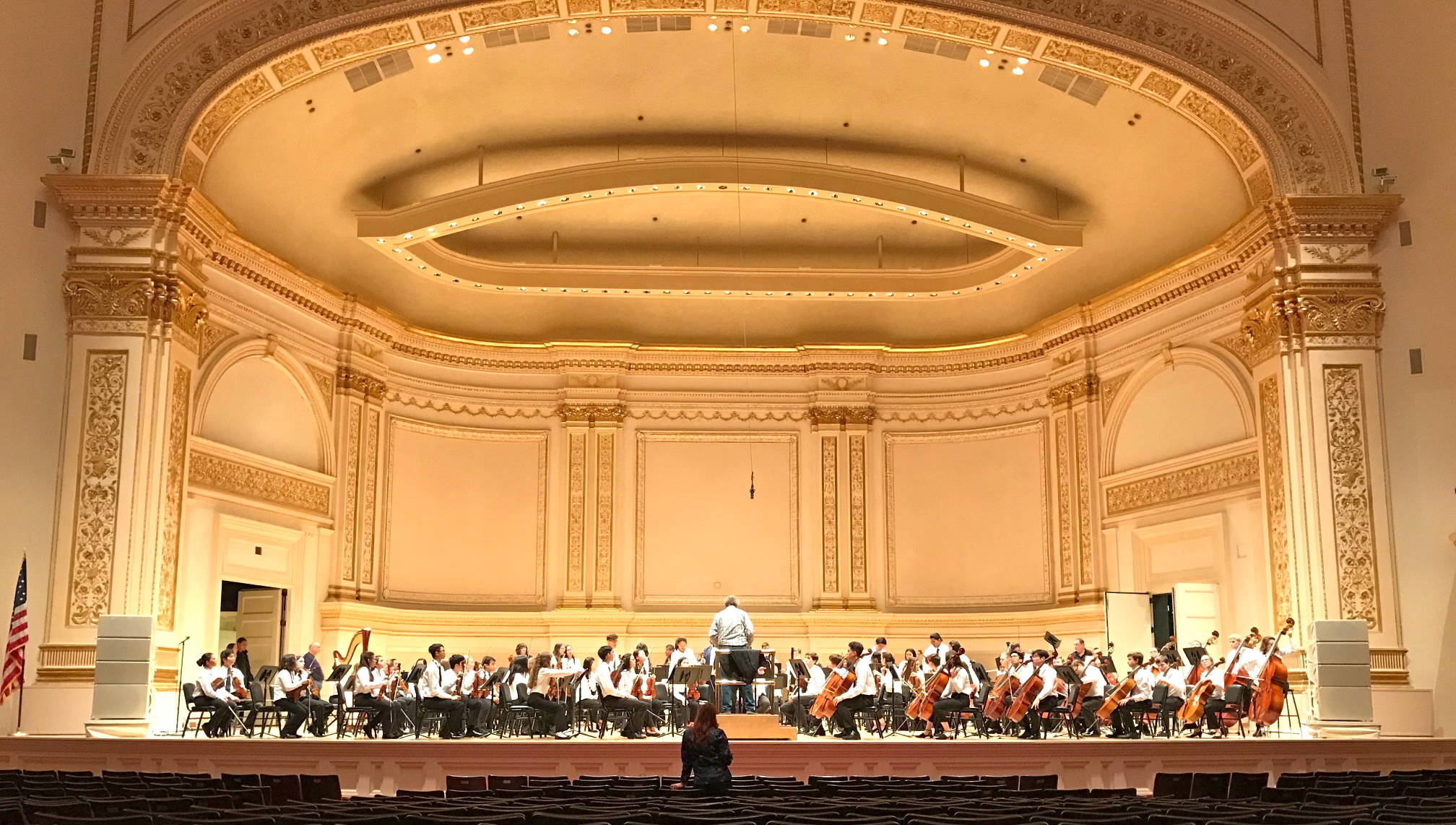Pamela Wright, Director of Strings at Orcas Island High School, and violinist Paris Wilson, Junior at OIHS, returned from New York City earlier this month with memories to last a lifetime. Their trip was part of the Carnegie Honors Performance Series. Each year the Honors board processes more than 18,000 nominations, and 650 high school musicians from around the world are selected to be part of five different musical ensembles after auditions are evaluated. On February 4 Wilson performed with the Honors Symphony Orchestra at Carnegie Hall.
“The whole experience was amazing,” said Pamela Wright. Wright was one of 35 music teachers/chaperones who escorted the student musicians over the course of their stay in New York City. The days were filled with rehearsals and the nights with sightseeing. Wright and Wilson, and others in their group, saw “The Lion King” on Broadway, enjoyed dinner and dancing on a private yacht with sights of the Statue of Liberty and Brooklyn Bridge, and toured Times Square and the Top of the Rock. Performing at Carnegie Hall was the highlight.
Under the heading of “it’s a small world” (or maybe “six degrees of Bruce Harvie”), Wright recounted a meeting with other chaperones in New York. “We were all sitting around introducing ourselves, and I said, ‘I’m from a small place called Orcas Island.’ And another chaperone and string bass maker piped up from across the room: ‘You’re from Orcas Island?! I buy the wood to make my basses from Orcas. From Bruce Harvie!’”
Wright was full of praise for the Honors Performance Series at Carnegie Hall. “It was very well done,” said Wright. “The conductors were first-rate and I learned a lot by watching them work with the kids.”
And Carnegie Hall itself? It was definitely a thrill. “The acoustics are crazy amazing,” said Wright. “The hall is stunning. The ushers are all in uniform. You can see the pride they have in taking care of everyone. And being backstage was a real treat. Walking through the green room, seeing all the rooms – it is huge backstage.”
Paris Wilson mentioned many highlights of the trip. On the first day of rehearsals she walked through the music stands starting from the back of the orchestra looking for her name, until she got to the front row and realized she was sitting second chair, sometimes referred to as associate concertmaster. “I was so surprised,” she said. She recalled another time going into a rehearsal room and seeing the same conductor she had performed under at the Sydney Opera House last July. When she walked into the room, he looked up and said, “Oh hi, Paris.”
On another occasion, a tuba player from her symphony orchestra was playing the blues and some of his own compositions on the piano, so Wilson got out her violin and started improvising along with him, and it turned into an impromptu performance with an audience of other musicians. “It was so much fun!” says Wilson.
The Honors Symphony Orchestra performed various movements from Stravinsky’s “Firebird Suite,” a contemporary composition by Dana Wilson titled “Hold Fast to Dreams,” and Manuel de Falla’s “Spanish Dance No. 1.” Of the students’ performance, Wright says, “They sounded amazing.”
“This experience is an achievable dream,” emphasizes Wright. “Other students on Orcas could have the opportunity to go to Carnegie if they develop their skills and put in some extra practice.” But it is not enough just to attend school classes. There are three keys to success, says Wright. First: the student must practice. Second: parents must persuade, motivate and assist their child to meet practice goals. Third: private lessons are pivotal. “I have a middle schooler who auditioned this year to attend the Carnegie program,” said Wright. “This experience is within reach of serious student musicians who are willing to put in the effort. And now, after observing this process, I have more tools to help these kids understand they can do this, too!”




